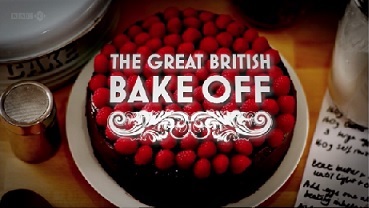The Great British Bake Off
Hosts: Mel Geidroyc and Sue Perkins
Judges: Mary Berry and Paul Hollywood
Directed by Andy Devonshire
Airs on BBC1 in the UK at 8 pm GMT on Wednesdays
It is a show that has sparked a number of copycats around the world, not to mention other reality contest shows in the UK. However, due to its simple premise, funny hosts, great judges and the odd sexual innuendo, it is now one of the most popular TV shows on UK television. In the four years that it has been on the air, what is so appealing about The Great British Bake Off? Before the programme began airing, baking was considered an old-fashioned hobby that was more commonly shared and perfected by older generations of women. From personal experience, baking was a part of ‘food economics’ lessons in school, and even then, the dishes were relatively simple, due to the constrained lesson times. There was simply not enough times to create Victoria Sandwiches and cupcakes, so relatively simple dishes such as scones, bread rolls and apple crumble were covered.
But with the help of monthly collect-and-keep publications such as Baked & Delicious, as the popularity of treats such as macaroons and cupcakes grew, so did the art of baking. Then, in 2010, two established bakers and the world of reality TV contests came together to form a new type of show. From the offset, GBBO adopts certain aspects of a reality TV competition, as it follows the contestants throughout each bake, while the audience watches their creations come together. However, unlike other competitive reality shows such as The X Factor and Britain’s Got Talent, GBBO doesn’t have the excess drama or the copious tears. There are no dramatic voiceovers, sentimental background music, or cringeworthy moments from pure embarrassment, making it a simpler, more mature show. Coupled with the sight of a pristine white tent in the picturesque countryside, GBBO presents itself as a quintessentially English programme.
Like all reality TV shows, GBBO needs star judges, and in the UK baking world, Paul Hollywood and Mary Berry are legends. During the first series, Hollywood, an established baker, and Berry, with more than 70 cookery books to her name, formed an unlikely partnership, sharing a mutual respect and rapport that has made them a household name. They have sharp tongues, an in-depth knowledge, and meticulous attention to detail (example: during the semi-final of the most recent series, the contestants had to make a Schichttorte, a grilled cake consisting of 20 layers. Paul Hollywood counted the number of layers in EACH cake), which proves that they know a thing or two about baking.
While Berry and Hollywood bring the business, hosts Mel Geidroyc and Sue Perkins bring the light relief. They cut the tension in the tent with their cheeky humour (including the occasional sexual innuendo), their genuine rapport with both the contestants and judges, and their childlike indulgence in snacking on the ingredient during the bakes themselves. In reflecting their own personalities on-screen, as well as incorporating their own personal chemistry as an established comedic duo, they raise the bar in terms of the show’s appeal, making it more watchable for audiences of all ages. But the gem of GBBO is its mass marketability. The fact that there are male and female bakers, young and old, is inspiring. The diversity it promotes in its contestants highlights a very modern approach to what is considered a predominately female craft. In addition, the variety of dishes, flavour combinations, and techniques the contestants showcase during the show encompasses a refreshing learning experience that dispels the boredom of the traditional baking programme. More and more people are now reaching for bakery books, silicon bakeware, and wooden spoons in the UK due to the modernisation of baking, and GBBO is a key factor in its revitalisation. If Pixar’s Ratatouille can prove that anyone can cook, the Great British Bake Off proves that anyone can bake.



